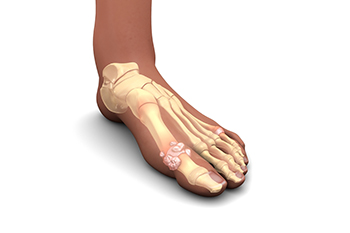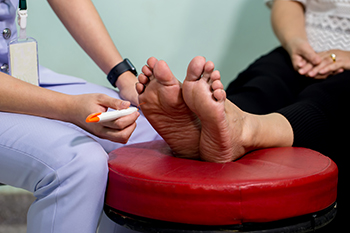(410) 764-7044
6506 Reisterstown Road, Baltimore
1205 York Road, Lutherville
6305 Belair Road, Baltimore
7809 Wise Avenue, Dundalk
April 2023
Possible Reasons for Foot Pain

The feet are the workhorses of the body, absorbing shock and force whenever you stand, walk, run, or jump. Because they contain a large number of bones, tendons, muscles, and ligaments, the feet are often at risk for pain. Injury is one of the most common causes of foot pain. This category includes bone fractures, direct trauma, ligament sprains, and muscle or tendon strains. Heel or arch pain is frequently caused by a tearing of the plantar fascia, a band of tissue in the sole of the foot that connects the toes and heels. Heel pain also may be caused by bone spurs, which can be a direct result of plantar fasciitis, or of the thinning of the heel pad as you age. Bunions, hammertoes, and other bone deformities can be another source of foot and toe pain. Gout, which is an inflammatory disease caused by having excess uric acid in the body, can be extremely painful, often targeting the big toe. Nerve problems such as sesamoiditis and Morton’s neuroma are other painful conditions of the feet. If you are experiencing any type of foot pain, it is suggested that you schedule an appointment with a podiatrist who can examine your foot, and diagnose the source before recommending the appropriate treatment options.
Foot Pain
Foot pain can be extremely painful and debilitating. If you have a foot pain, consult with one of our podiatrists from Plaza Podiatry. Our doctors will assess your condition and provide you with quality foot and ankle treatment.
Causes
Foot pain is a very broad condition that could be caused by one or more ailments. The most common include:
- Bunions
- Hammertoes
- Plantar Fasciitis
- Bone Spurs
- Corns
- Tarsal Tunnel Syndrome
- Ingrown Toenails
- Arthritis (such as Gout, Rheumatoid, and Osteoarthritis)
- Flat Feet
- Injury (from stress fractures, broken toe, foot, ankle, Achilles tendon ruptures, and sprains)
- And more
Diagnosis
To figure out the cause of foot pain, podiatrists utilize several different methods. This can range from simple visual inspections and sensation tests to X-rays and MRI scans. Prior medical history, family medical history, and any recent physical traumatic events will all be taken into consideration for a proper diagnosis.
Treatment
Treatment depends upon the cause of the foot pain. Whether it is resting, staying off the foot, or having surgery; podiatrists have a number of treatment options available for foot pain.
If you have any questions, please feel free to contact our offices located in Baltimore, Lutherville, and Dundalk, MD . We offer the newest diagnostic and treatment technologies for all your foot care needs.
Who Gets Gout?

The pain from the arthritic condition, known as gout, is generally found in the joints of the big toe. It happens due to excess uric acid in the bloodstream that converts into crystals. People who eat large amounts of specific foods such as shellfish and red meat or that drink excessive amounts of alcohol may be prone to developing gout. Additionally, people with high blood pressure, diabetes, or heart disease may develop gout, and immediate care is often needed. It may also occur for genetic reasons, and common symptoms of this condition can include extreme pain. Patients may notice the affected joints are tender and warm when touched. Prevention methods can include drinking plenty of water daily and consuming nutrient-rich foods. If you have developed gout, it is strongly suggested that you are under the care of a podiatrist who can effectively diagnose and treat this condition.
Gout is a painful condition that can be treated. If you are seeking treatment, contact one of our podiatrists from Plaza Podiatry. Our doctors will treat your foot and ankle needs.
What Is Gout?
Gout is a form of arthritis that is characterized by sudden, severe attacks of pain, redness, and tenderness in the joints. The condition usually affects the joint at the base of the big toe. A gout attack can occur at any random time, such as the middle of the night while you are asleep.
Symptoms
- Intense Joint Pain - Usually around the large joint of your big toe, and it most severe within the first four to twelve hours
- Lingering Discomfort - Joint discomfort may last from a few days to a few weeks
- Inflammation and Redness -Affected joints may become swollen, tender, warm and red
- Limited Range of Motion - May experience a decrease in joint mobility
Risk Factors
- Genetics - If family members have gout, you’re more likely to have it
- Medications - Diuretic medications can raise uric acid levels
- Gender/Age - Gout is more common in men until the age of 60. It is believed that estrogen protects women until that point
- Diet - Eating red meat and shellfish increases your risk
- Alcohol - Having more than two alcoholic drinks per day increases your risk
- Obesity - Obese people are at a higher risk for gout
Prior to visiting your podiatrist to receive treatment for gout, there are a few things you should do beforehand. If you have gout you should write down your symptoms--including when they started and how often you experience them, important medical information you may have, and any questions you may have. Writing down these three things will help your podiatrist in assessing your specific situation so that he or she may provide the best route of treatment for you.
If you have any questions, please feel free to contact our offices located in Baltimore, Lutherville, and Dundalk, MD . We offer the newest diagnostic and treatment technologies for all your foot care needs.
Wounds That Don't Heal Need to Be Checked
Women Are More at Risk for Heel Pain

Studies show that women experience heel pain more frequently than men. Wearing high heels is thought to be the number one cause of heel pain in women. This leaves them more at risk for developing plantar fasciitis, the main complaint of which is heel pain. The band of tissue that runs beneath the foot, called the plantar fascia, becomes inflamed resulting in pain. However, other types of footwear common among women can also contribute to heel pain. Among them are shoes of any type that have a narrow toe box and pointy toes. Changing to footwear that properly supports the foot is one sure way to lower the risk of heel pain. Try to limit the height of heels to 1.5 inches, and check footwear for ample cushioning, arch support, and flexibility in the sole. In addition, starting a regular routine of foot stretches can help relieve tightness in the arch and heel. In some cases, special orthotic inserts for the shoes can diminish pain in the heels. For any type of heel pain that impedes your daily activities, it is suggested that you make an appointment with a podiatrist for an exam to determine the cause and prescribe custom orthotics if needed.
Many people suffer from bouts of heel pain. For more information, contact one of our podiatrists of Plaza Podiatry. Our doctors can provide the care you need to keep you pain-free and on your feet.
Causes of Heel Pain
Heel pain is often associated with plantar fasciitis. The plantar fascia is a band of tissues that extends along the bottom of the foot. A rip or tear in this ligament can cause inflammation of the tissue.
Achilles tendonitis is another cause of heel pain. Inflammation of the Achilles tendon will cause pain from fractures and muscle tearing. Lack of flexibility is also another symptom.
Heel spurs are another cause of pain. When the tissues of the plantar fascia undergo a great deal of stress, it can lead to ligament separation from the heel bone, causing heel spurs.
Why Might Heel Pain Occur?
- Wearing ill-fitting shoes
- Wearing non-supportive shoes
- Weight change
- Excessive running
Treatments
Heel pain should be treated as soon as possible for immediate results. Keeping your feet in a stress-free environment will help. If you suffer from Achilles tendonitis or plantar fasciitis, applying ice will reduce the swelling. Stretching before an exercise like running will help the muscles. Using all these tips will help make heel pain a condition of the past.
If you have any questions please contact our offices located in Baltimore, Lutherville, and Dundalk, MD . We offer the newest diagnostic and treatment technologies for all your foot and ankle needs.
Foot Care Can Help to Prevent Diabetic Ulcers

Diabetics can be in danger of foot and toe problems as a result of sustained high blood sugar levels. Commonly, diabetes causes neuropathy in the lower extremities, which results in numbness and can put the patient in danger of developing a foot ulcer. Because the feeling in the feet is limited or absent, cuts, sores, and cracks in the skin may go unnoticed. Another underlying condition, called peripheral artery disease, can clog the blood vessels in the feet, making it more difficult for any such injuries to heal. This combination can lead to skin ulcers that if not attended to can cause gangrene. Experts suggest a daily foot care regime that can prevent ulcers from forming. It includes washing and drying the feet daily, inspecting them for sores, wearing shoes that are comfortable and fit well, and avoiding going barefoot. Keep the feet elevated when possible and perform light foot exercises, such as wiggling the toes and rotating the ankles to get the circulation going. If you have noticed a sore on your foot that is taking a long time to heal, it is suggested that you make an appointment with a podiatrist.
Diabetic foot care is important in preventing foot ailments such as ulcers. If you are suffering from diabetes or have any other concerns about your feet, contact one of our podiatrists from Plaza Podiatry. Our doctors can provide the care you need to keep you pain-free and on your feet.
Diabetic Foot Care
Diabetes affects millions of people every year. The condition can damage blood vessels in many parts of the body, especially the feet. Because of this, taking care of your feet is essential if you have diabetes, and having a podiatrist help monitor your foot health is highly recommended.
The Importance of Caring for Your Feet
- Routinely inspect your feet for bruises or sores.
- Wear socks that fit your feet comfortably.
- Wear comfortable shoes that provide adequate support.
Patients with diabetes should have their doctor monitor their blood levels, as blood sugar levels play such a huge role in diabetic care. Monitoring these levels on a regular basis is highly advised.
It is always best to inform your healthcare professional of any concerns you may have regarding your feet, especially for diabetic patients. Early treatment and routine foot examinations are keys to maintaining proper health, especially because severe complications can arise if proper treatment is not applied.
If you have any questions please feel free to contact our offices located in Baltimore, Lutherville, and Dundalk, MD . We offer the newest diagnostic and treatment technologies for all your foot and ankle needs.





